六年级英语上册重点知识点及语法(7月20日).pdf
六年级上册英语知识点总结
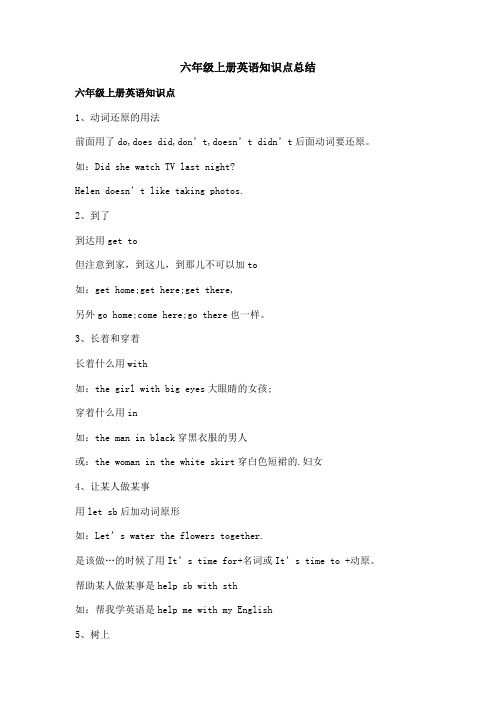
六年级上册英语知识点总结六年级上册英语知识点1、动词还原的用法前面用了do,does did,don’t,doesn’t didn’t后面动词要还原。
如:Did she watch TV last night?Helen doesn’t like taking photos.2、到了到达用get to但注意到家,到这儿,到那儿不可以加to如:get home;get here;get there,另外go home;come here;go there也一样。
3、长着和穿着长着什么用with如:the girl with big eyes大眼睛的女孩;穿着什么用in如:the man in black穿黑衣服的男人或:the woman in the white skirt穿白色短裙的.妇女4、让某人做某事用let sb后加动词原形如:Let’s water the flowers together.是该做…的时候了用It’s time for+名词或It’s time to +动原。
帮助某人做某事是help sb with sth如:帮我学英语是help me with my English5、树上外来的东西在树上用in the tree如:the bird in the tree;树上长的用on the tree如:the apples on the tree6、运动和乐器球类之前不加the;乐器之前必须加the如:play the piano;play football7、一周中的第一天是Sunday;一年中的第一个月是January。
8、get后加比较级表示变得更怎么样如:get stronger;get longer9、比较两者比较用比较级,三者以上比较用级如:Who runs faster,the boy or the girl? The boy does谁跑得更快,男孩还是女孩?男孩。
六年级英语上册重点知识点及语法-六上英语知识点(最新最全)
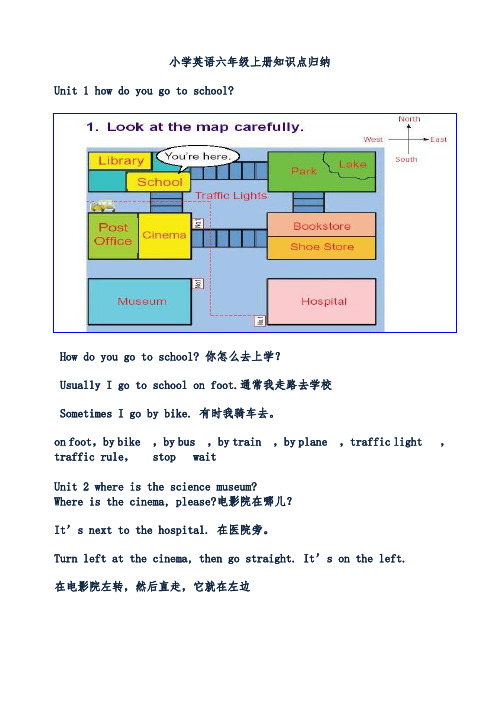
小学英语六年级上册知识点归纳Unit 1 how do you go to school?How do you go to school? 你怎么去上学?Usually I go to school on foot.通常我走路去学校Sometimes I go by bike. 有时我骑车去。
on foot,by bike ,by bus ,by train ,by plane ,traffic light ,traffic rule, stop waitUnit 2 where is the science museum?Where is the cinema, please?电影院在哪儿?It’s next to the hospital. 在医院旁。
Turn left at the cinema, then go straight. It’s on the left.在电影院左转,然后直走,它就在左边library post,office hospital ,cinema , bookstore , next to ,turn right , turn left , go straight , then ,Unit 3 what are you going to do?What are you going to do on the weekend?周末你准备去哪儿?I’m going to visit my grandparents this weekend. 这个周末我要去看望我祖父母。
Where are you going this afternoon?今天下午你去哪儿?I’m going to the bookstore. 我要去书店。
What are you going to buy? 你要去买什么?I am going to buy a comic book..我要去买一本漫画书。
英语六年级上册总知识点
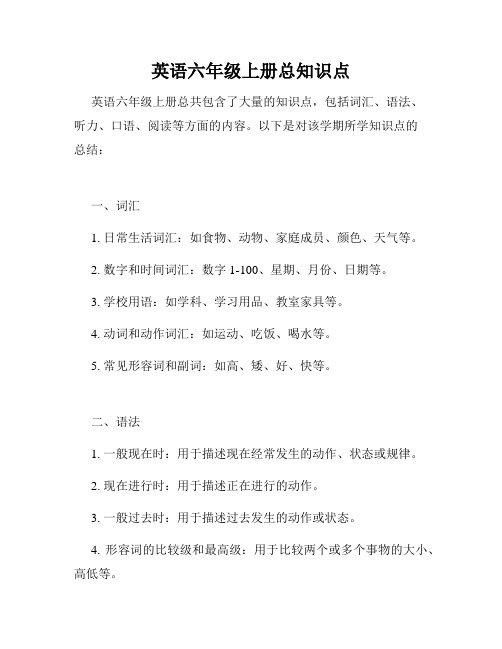
英语六年级上册总知识点
英语六年级上册总共包含了大量的知识点,包括词汇、语法、
听力、口语、阅读等方面的内容。
以下是对该学期所学知识点的
总结:
一、词汇
1. 日常生活词汇:如食物、动物、家庭成员、颜色、天气等。
2. 数字和时间词汇:数字1-100、星期、月份、日期等。
3. 学校用语:如学科、学习用品、教室家具等。
4. 动词和动作词汇:如运动、吃饭、喝水等。
5. 常见形容词和副词:如高、矮、好、快等。
二、语法
1. 一般现在时:用于描述现在经常发生的动作、状态或规律。
2. 现在进行时:用于描述正在进行的动作。
3. 一般过去时:用于描述过去发生的动作或状态。
4. 形容词的比较级和最高级:用于比较两个或多个事物的大小、高低等。
5. 数词与名词的搭配:用于描述数量、顺序等。
三、听力
1. 听懂日常对话和简单说明。
2. 听懂短文并回答相关问题。
3. 根据听到的信息判断对错。
四、口语
1. 学习正确的发音和语调,尤其是单词的重音位置。
2. 运用所学词汇和语法进行简单对话和交流。
3. 模仿、朗读短文,提高口语表达能力。
五、阅读
1. 阅读简单的短文,了解故事情节及相关信息。
2. 根据短文回答问题,提高阅读理解能力。
以上是英语六年级上册的总知识点。
通过系统的学习,学生可
以掌握基本的词汇和语法知识,并能够进行简单的听说读写训练。
希望同学们能够在学期末的考试中取得优异的成绩!。
六年级英语上册知识点总结
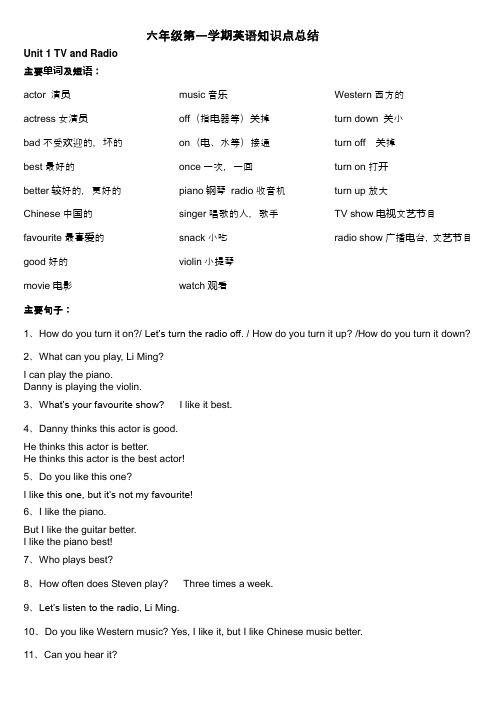
六年级第一学期英语知识点总结Unit 1 TV and Radio主要单词及短语:actor 演员actress女演员bad不受欢迎的,坏的best最好的better较好的,更好的Chinese中国的favourite最喜爱的good好的movie电影music音乐off(指电器等)关掉on(电、水等)接通once一次,一回piano钢琴radio收音机singer唱歌的人,歌手snack小吃violin小提琴watch观看Western西方的turn down 关小turn off 关掉turn on打开turn up放大TV show电视文艺节目radio show广播电台,文艺节目主要句子:1、How do you turn it on?/ Let’s turn the radio off. / How do you turn it up? /How do you turn it down?2、What can you play, Li Ming?I can play the piano.Danny is playing the violin.3、What’s your favourite show?I like it best.4、Danny thinks this actor is good.He thinks this actor is better.He thinks this actor is the best actor!5、Do you like this one?I like this one, but it’s not my favourite!6、I like the piano.But I like the guitar better.I like the piano best!7、Who plays best?8、How often does Steven play? Three times a week.9、Let’s listen to the radio, Li Ming.10、Do you like Western music? Yes, I like it, but I like Chinese music better.11、Can you hear it?12、Why is the radio playing Chinese music?13、Thanks for finding this radio show.14、Dinosaurs and people are different. I think dinosaurs and people are the same.15、What did you like best?I liked the dinosaur better than the rabbit, but I liked the snacks best.16、They order some food.17、Jenny wants Western food. “I would like a hamburger, French fries and milk, please.”18、I would like some Chinese food, please. I would like some noodles, dumplings and tea.19、There are many people at the restaurant.20、I can’t hear her. I can’t hear her either.重点语法复习:绝大多数形容词有三种形式,原级,比较级和最高级, 以表示形容词说明的性质在程度上的不同。
六年级上册英语必考点(一)
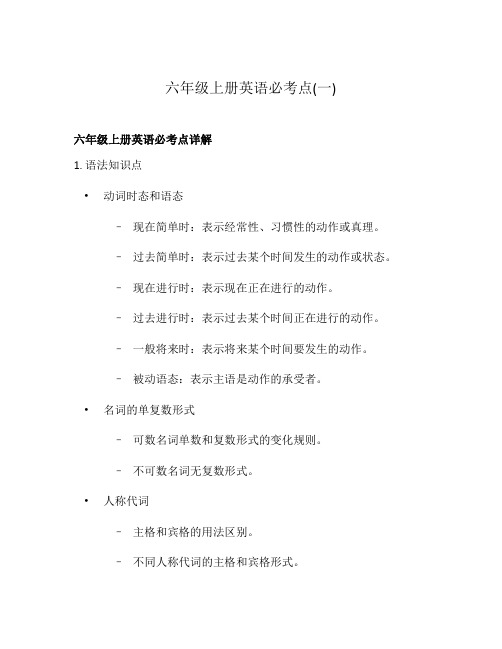
六年级上册英语必考点(一)六年级上册英语必考点详解1. 语法知识点•动词时态和语态–现在简单时:表示经常性、习惯性的动作或真理。
–过去简单时:表示过去某个时间发生的动作或状态。
–现在进行时:表示现在正在进行的动作。
–过去进行时:表示过去某个时间正在进行的动作。
–一般将来时:表示将来某个时间要发生的动作。
–被动语态:表示主语是动作的承受者。
•名词的单复数形式–可数名词单数和复数形式的变化规则。
–不可数名词无复数形式。
•人称代词–主格和宾格的用法区别。
–不同人称代词的主格和宾格形式。
•冠词的用法–不定冠词a/an和定冠词the的用法区别。
–特指和泛指的判断准则。
2. 词汇知识点•高频单词和短语–常见的名词、动词、形容词等单词。
–常用的表达方式和短语。
•反义词和同义词–常见的词汇反义词对照和同义词替换。
•词组和固定搭配–常见的固定搭配形式。
3. 阅读理解•根据文章内容选择正确答案–阅读短文,回答问题。
•根据提示填写正确单词–阅读短文,根据提示填写空缺处的单词。
•连词成句–根据所给单词,按正确顺序连成完整的句子。
4. 听力理解•根据听到的问题选择正确答案–听录音,根据问题选择正确的答案。
•听录音填写单词或句子–听录音,根据所听内容填写空缺处的单词或完整句子。
•听录音排序–听录音,根据所听内容的顺序排列。
以上仅为六年级上册英语必考点的部分内容,希望各位同学能够认真复习,提前准备,取得好成绩!六年级上册英语必考点详解(续)5. 句子结构和用法•陈述句、疑问句、祈使句和感叹句–陈述句用于陈述一个事实或描述一个情况。
–疑问句用于提问,包括一般疑问句和特殊疑问句。
–祈使句用于发出命令、请求或建议。
–感叹句用于表达强烈的情感或惊讶。
•直接引语和间接引语–直接引语是原封不动地引述他人的话语。
–间接引语是用自己的语言将他人的话语表达出来。
6. 写作技巧•书写格式和规范–首字母大写、标点符号和段落格式的运用。
•运用连词和过渡词–使用适当的连词和过渡词使文章的结构更加流畅。
六年级英语上册知识点总结
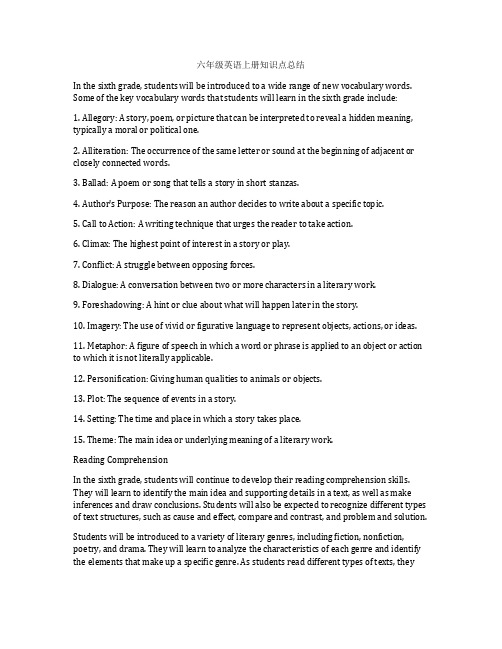
六年级英语上册知识点总结In the sixth grade, students will be introduced to a wide range of new vocabulary words. Some of the key vocabulary words that students will learn in the sixth grade include:1. Allegory: A story, poem, or picture that can be interpreted to reveal a hidden meaning, typically a moral or political one.2. Alliteration: The occurrence of the same letter or sound at the beginning of adjacent or closely connected words.3. Ballad: A poem or song that tells a story in short stanzas.4. Author's Purpose: The reason an author decides to write about a specific topic.5. Call to Action: A writing technique that urges the reader to take action.6. Climax: The highest point of interest in a story or play.7. Conflict: A struggle between opposing forces.8. Dialogue: A conversation between two or more characters in a literary work.9. Foreshadowing: A hint or clue about what will happen later in the story.10. Imagery: The use of vivid or figurative language to represent objects, actions, or ideas.11. Metaphor: A figure of speech in which a word or phrase is applied to an object or action to which it is not literally applicable.12. Personification: Giving human qualities to animals or objects.13. Plot: The sequence of events in a story.14. Setting: The time and place in which a story takes place.15. Theme: The main idea or underlying meaning of a literary work.Reading ComprehensionIn the sixth grade, students will continue to develop their reading comprehension skills. They will learn to identify the main idea and supporting details in a text, as well as make inferences and draw conclusions. Students will also be expected to recognize different types of text structures, such as cause and effect, compare and contrast, and problem and solution. Students will be introduced to a variety of literary genres, including fiction, nonfiction, poetry, and drama. They will learn to analyze the characteristics of each genre and identify the elements that make up a specific genre. As students read different types of texts, theywill also explore the author's purpose and consider how the author's choices contribute to the overall meaning of the text.Writing SkillsIn the sixth grade, students will continue to build their writing skills and develop their ability to express themselves effectively through writing. Students will learn to write in a variety of genres, including narrative, expository, persuasive, and descriptive writing. They will learn to structure their writing using paragraphs, dialogue, and descriptive language. Students will also learn to plan and organize their writing by creating outlines, brainstorming ideas, and using graphic organizers. They will be introduced to the writing process, which includes prewriting, drafting, revising, editing, and publishing. Students will also learn important grammar and punctuation rules, including the proper use of commas, apostrophes, and capitalization.Literary AnalysisIn the sixth grade, students will learn to analyze and interpret literary texts. They will be introduced to literary elements such as plot, character, setting, and theme, and will learn to identify these elements in a variety of texts. Students will learn to analyze the impact of specific word choices, literary devices, and figurative language on the overall meaning of a text.Students will also learn to analyze the structure of a text, including the organization of the plot, the use of flashbacks and foreshadowing, and the development of the conflict. They will learn to consider the impact of the author's choices on the reader and make connections between the text and their own experiences.Listening and SpeakingIn the sixth grade, students will continue to develop their listening and speaking skills. They will learn to listen actively and attentively, asking questions and making connections to the content. Students will also learn to speak clearly and confidently, expressing their ideas and opinions effectively to others.Students will develop their ability to communicate in different situations, such as participating in group discussions, giving oral presentations, and delivering speeches. They will learn to use appropriate language and tone in different situations and consider the needs and perspectives of their audience.Research SkillsIn the sixth grade, students will begin to develop their research skills. They will learn to locate and select appropriate sources of information, and to use these sources to gather and organize information. Students will learn to paraphrase and summarize information from sources, as well as cite their sources correctly.Students will also learn to evaluate the credibility and reliability of sources, and to consider bias, perspective, and point of view. They will learn to use technology to conduct research, and to present their findings using a variety of formats, such as reports, presentations, and multimedia projects.By the end of the sixth grade, students will have developed a strong foundation in reading, writing, listening, speaking, and research skills. They will be prepared to continue building on these skills in the seventh grade, as well as apply them to a variety of academic and real-life situations.。
六年级上册英语语法总结
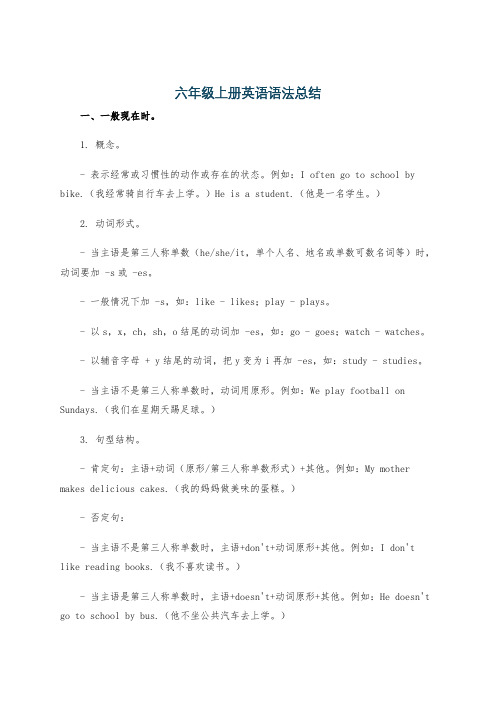
六年级上册英语语法总结一、一般现在时。
1. 概念。
- 表示经常或习惯性的动作或存在的状态。
例如:I often go to school by bike.(我经常骑自行车去上学。
)He is a student.(他是一名学生。
)2. 动词形式。
- 当主语是第三人称单数(he/she/it,单个人名、地名或单数可数名词等)时,动词要加 -s或 -es。
- 一般情况下加 -s,如:like - likes;play - plays。
- 以s,x,ch,sh,o结尾的动词加 -es,如:go - goes;watch - watches。
- 以辅音字母 + y结尾的动词,把y变为i再加 -es,如:study - studies。
- 当主语不是第三人称单数时,动词用原形。
例如:We play football on Sundays.(我们在星期天踢足球。
)3. 句型结构。
- 肯定句:主语+动词(原形/第三人称单数形式)+其他。
例如:My mother makes delicious cakes.(我的妈妈做美味的蛋糕。
)- 否定句:- 当主语不是第三人称单数时,主语+don't+动词原形+其他。
例如:I don't like reading books.(我不喜欢读书。
)- 当主语是第三人称单数时,主语+doesn't+动词原形+其他。
例如:He doesn't go to school by bus.(他不坐公共汽车去上学。
)- 当主语不是第三人称单数时,Do+主语+动词原形+其他?例如:Do you have a pen?(你有一支钢笔吗?)- 当主语是第三人称单数时,Does+主语+动词原形+其他?例如:Does she like music?(她喜欢音乐吗?)二、名词的单复数。
1. 规则变化。
- 一般情况在词尾加 -s,如:book - books;pen - pens。
六上英语第六单元知识点
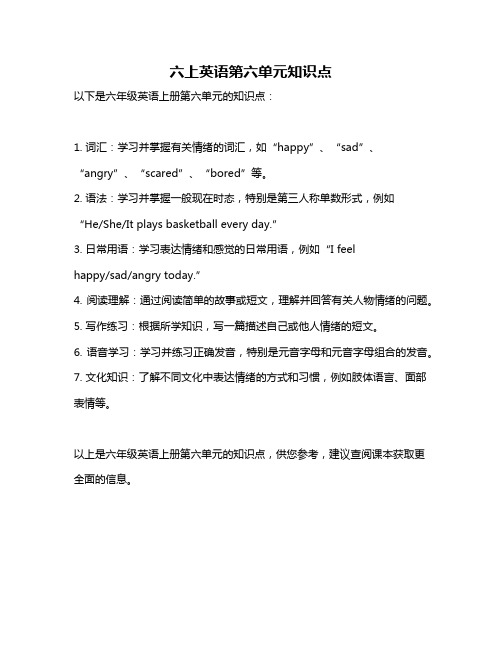
六上英语第六单元知识点
以下是六年级英语上册第六单元的知识点:
1. 词汇:学习并掌握有关情绪的词汇,如“happy”、“sad”、“angry”、“scared”、“bored”等。
2. 语法:学习并掌握一般现在时态,特别是第三人称单数形式,例如
“He/She/It plays basketball every day.”
3. 日常用语:学习表达情绪和感觉的日常用语,例如“I feel
happy/sad/angry today.”
4. 阅读理解:通过阅读简单的故事或短文,理解并回答有关人物情绪的问题。
5. 写作练习:根据所学知识,写一篇描述自己或他人情绪的短文。
6. 语音学习:学习并练习正确发音,特别是元音字母和元音字母组合的发音。
7. 文化知识:了解不同文化中表达情绪的方式和习惯,例如肢体语言、面部表情等。
以上是六年级英语上册第六单元的知识点,供您参考,建议查阅课本获取更全面的信息。
新人教(PEP)六年级英语上册全册语法知识点复习
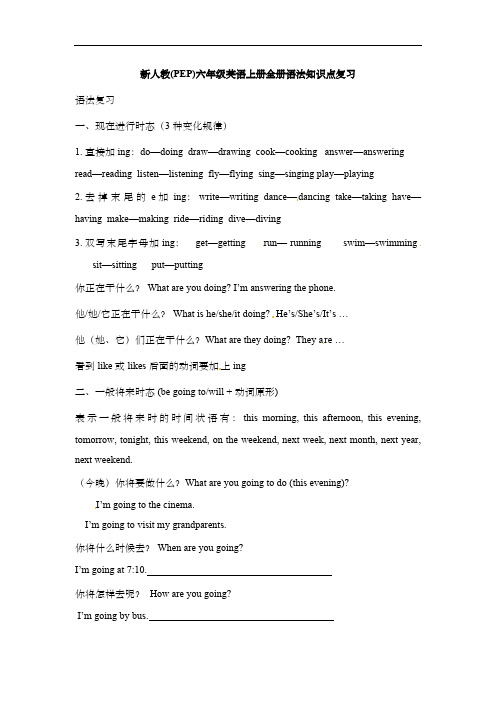
新人教(PEP)六年级英语上册全册语法知识点复习语法复习一、现在进行时态(3种变化规律)1. 直接加ing:do—doing draw—drawing cook—cooking answer—answering read—reading listen—listening fly—flying sing—singing play—playing2. 去掉末尾的e加ing:write—writing dance—dancing take—taking have—having make—making ride—riding dive—diving3. 双写末尾字母加ing: get—getting run— running swim—swimmingsit—sitting put—putting你正在干什么? What are you doing? I’m answering the phone.他/她/它正在干什么? What is he/she/it doing? He’s/She’s/It’s …他(她、它)们正在干什么?What are they doing? They a re …看到like或likes后面的动词要加上ing二、一般将来时态 (be going to/will + 动词原形)表示一般将来时的时间状语有:this morning, this afternoon, this evening, tomorrow, tonight, this weekend, on the weekend, next week, next month, next year, next weekend.(今晚)你将要做什么?What are you going to do (this evening)?I’m going to the cinema.I’m going to visit my grandparents.你将什么时候去? When are you going?I’m going at 7:10.你将怎样去呢? How are you going?I’m going by bus.今天下午你将要去哪里?Where are you going this after noon?I’m going to the bookstore.你将要买什么呢? What are you going to buy?I’m going to buy a comic book.你将和谁一起去? Who are you going with? I’m going with my parents.三、第三人称单数He 、She、It 后面的动词要加s或es1. 一般情况加s,如:read—reads;live—lives;play—plays;sing—sings2. 动词末尾以s,x,ch,sh或部分以o结尾的加es。
六年级英语上册知识点归纳总结
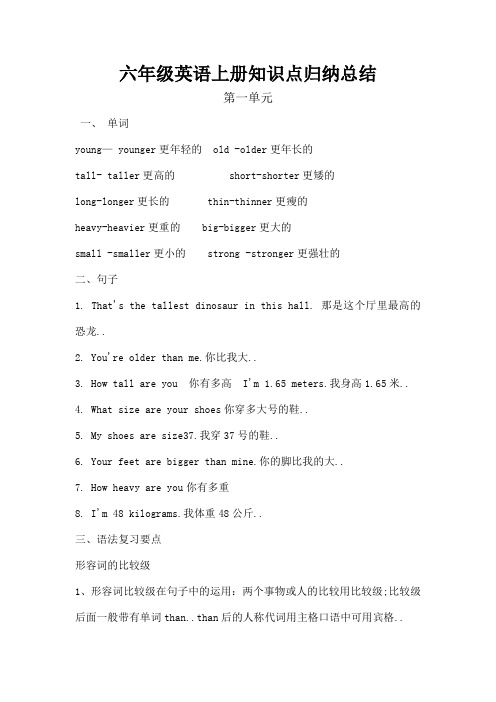
六年级英语上册知识点归纳总结第一单元一、单词young— younger更年轻的 old -older更年长的tall- taller更高的 short-shorter更矮的long-longer更长的 thin-thinner更瘦的heavy-heavier更重的 big-bigger更大的small -smaller更小的 strong -stronger更强壮的二、句子1. That's the tallest dinosaur in this hall. 那是这个厅里最高的恐龙..2. You're older than me.你比我大..3. How tall are you 你有多高 I'm 1.65 meters.我身高1.65米..4. What size are your shoes你穿多大号的鞋..5. My shoes are size37.我穿37号的鞋..6. Your feet are bigger than mine.你的脚比我的大..7. How heavy are you你有多重8. I'm 48 kilograms.我体重48公斤..三、语法复习要点形容词的比较级1、形容词比较级在句子中的运用:两个事物或人的比较用比较级;比较级后面一般带有单词than..than后的人称代词用主格口语中可用宾格..2.形容词加er的规则:⑴一般在词尾加er ;⑵以字母e 结尾;加r ;nice---nicer⑶以一个元音字母和一个辅音字母结尾;应双写末尾的辅音字母;再加er ;big--- bigger thin---- thinner⑷以“辅音字母+y”结尾;先把y变i;再加er ..heavy----heavier3.不规则形容词比较级: good/well-better例句:1.It's taller than both of us together.它比我俩加起来还高..2.Your feet are bigger than mine.你的脚比我的大..3.I’m heavier than you.我比你重..第二单元一、单词clean打扫 -- cleanedclean 的过去式stay停留 -- stayed stay的过去式wash洗—— washedwash的过去式watch看——watchedwatch的过去式have患病——hadhave的过去式sleep 睡觉——slept sleep 的过去式read读——readread的过去式see 看见——sawsee的过去式last 上一个的 yesterday 昨天 before在…之前二、短语Last weekend上个周末 last night昨晚 last Monday上周一 the day before yesterday前天clean my room 打扫我的房间 wash my clothes 洗衣服 stay at home呆在家里watch TV看电视 read a book 读书 seea film 看电影 have a cold 感冒三、句子1. How was your weekend你周末过得怎么样2. It was good/fine/Ok;thank you.很好;谢谢3. What did you do last weekend你上个周末干了什么4.I stayed at home with your grandma.我和你奶奶呆在家里.with和谁5. Did you do anything else你还做了其他什么事吗6. Yes;I cleaned my room and washed my clothes.是的;我扫了房间;还洗了衣服..7.I want to buy the new film magazine.我想买期新的电影杂志..8.Did you see a film你看电影了吗No;I didn’t .I had a cold. I stayed at home all weekend and slept.没有;我感冒了..整个周末都呆在家里睡觉..肯定回答Yes;I did.四、语法知识:一般过去时1.一般过去时表示过去某个时间发生的动作或存在的状态;常和表示过去的时间状语连用..一般过去时也表示过去经常或反复发生的动作..2.Be动词在一般过去时中的变化:⑴am 和is在一般过去时中变为was..was not=wasn’t⑵are在一般过去时中变为were..were not=weren’t⑶带有was或were的句子;其否定、疑问的变化和is; am; are一样;即否定句在was或were后加not;一般疑问句把was或were调到句首.. 3.句中没有be动词的一般过去时的句子1 否定句:didn’t +动词原形;如:Jim didn’t go home yesterday. 2一般疑问句:在句首加did;句子中的动词过去式变回原形..如:Did Jim go home yesterday3特殊疑问句:疑问词+did+主语+动词原形如:What did you do yesterday I read a book.第三单元一、单词go 去——went去 fish 钓鱼 ride骑-- rode 骑 hurt受伤-- hurt 受伤eat 吃--ate 吃 take—took buy买-- boughtgo camping --went camping 去野营go fishing --went fishing 去钓鱼go swimming—went swimming去游泳take pictures —took pictures 照相buy gifts—bought gifts 买礼物二、短语ride a horse 骑马 -- rode a horse 骑马ride a bike骑自行车-- rode a bike 骑自行车hurt my foot——hurt my foot 我的脚受伤eat fresh food--ate fresh food 吃新鲜食物 far from 远离 look like 看起来像三、句子1.What happened怎么了2.Are you right你还好吧3.I'm OK now.我现在没事了..4.Where did you go yesterday昨天你去哪儿了 I went to a park.我去公园了..5.It looks like a mule.它看起来像头骡子..6.Did you go to Turpan Yes;we did.你们去吐鲁番了吗是的;去了..7.How did you go there你们怎么去的8.We went there by plane. 我们做飞机去..9.Sounds great.听上去不错..四、语法知识:动词过去式变化规则:1.一般在动词末尾加-ed;如:clean-cleaned; cook-cooked ;stay-stayed;2.结尾是e加d;如:live-lived;like-liked3.末尾只有一个元音字母和一个辅音字母的重读闭音节;应双写末尾的辅音字母;再加-ed;如:stop-stopped;4.以“辅音字母+y”结尾的;变y为i; 再加-ed;如:study-studiedcry-cried5.不规则动词过去式:read--read; hurt--hurt; am/is--was; are--were; do--did; see--saw;sleep--slept; buy--bought; get--got; go--went; have--had; eat--ate;take--took; run--ran; sing--sang; make--made; drink--drank; ride--rode;come--came; give--gave第四单元一、单词dining hall 饭厅grass草坪 gym 体育馆ago 以前cycling骑自行车运动 ice-skate滑冰 badminton羽毛球运动二、短语…years ago 几年前…months ago几个月前last year 去年 last month上个月go cycling 去骑自行车 play badminton 打羽毛球三、句子1.There was no library in my old school.我以前的学校里没有图书馆..2.Tell us about your school; please.请给我们讲讲您的学校吧3.How do you know that你是怎么知道的4.There was no computer or Internet in my time.我那时候没有电脑也没有网络..5.Before;I was quiet. Now I am very active in class.我以前很安静..现在我在课堂上很活跃..6.I was short; so I couldn't ride my bike well.我以前个子小;自行车骑得不好..7.Now I go cycling every day.现在我天天骑车..。
(完整版)人教版六年级英语上册各单元知识点汇总,推荐文档
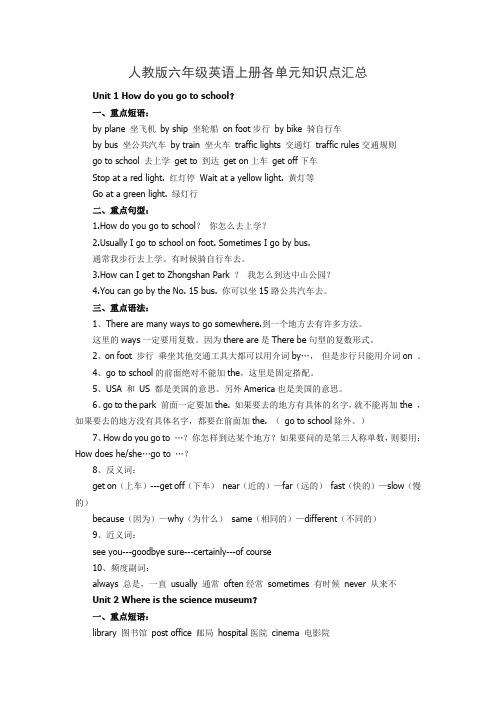
人教版六年级英语上册各单元知识点汇总Unit 1 How do you go to school?一、重点短语:by plane 坐飞机by ship 坐轮船on foot步行by bike 骑自行车by bus 坐公共汽车by train 坐火车traffic lights 交通灯traffic rules交通规则go to school 去上学get to 到达get on上车get off下车Stop at a red light. 红灯停Wait at a yellow light. 黄灯等Go at a green light. 绿灯行二、重点句型:1.How do you go to school?你怎么去上学?ually I go to school on foot. Sometimes I go by bus.通常我步行去上学。
有时候骑自行车去。
3.How can I get to Zhongshan Park ?我怎么到达中山公园?4.You can go by the No. 15 bus. 你可以坐15路公共汽车去。
三、重点语法:1、There are many ways to go somewhere.到一个地方去有许多方法。
这里的ways一定要用复数。
因为there are是There be句型的复数形式。
2、on foot 步行乘坐其他交通工具大都可以用介词by…,但是步行只能用介词on 。
4、go to school的前面绝对不能加the,这里是固定搭配。
5、USA 和US 都是美国的意思。
另外America也是美国的意思。
6、go to the park 前面一定要加the. 如果要去的地方有具体的名字,就不能再加the ,如果要去的地方没有具体名字,都要在前面加the. (go to school除外。
)7、How do you go to …?你怎样到达某个地方?如果要问的是第三人称单数,则要用:How does he/she…go to …?8、反义词:get on(上车)---get off(下车)near(近的)—far(远的)fast(快的)—slow(慢的)because(因为)—why(为什么)same(相同的)—different(不同的)9、近义词:see you---goodbye sure---certainly---of course10、频度副词:always 总是,一直usually 通常often经常sometimes 有时候never 从来不Unit 2 Where is the science museum?一、重点短语:library 图书馆post office 邮局hospital医院cinema 电影院bookstore书店science museum科学博物馆turn left向左转turn right 向右转go straight 直行north北south南east东west西next to靠近、与……。
六年级上册英语第六单元知识点归纳
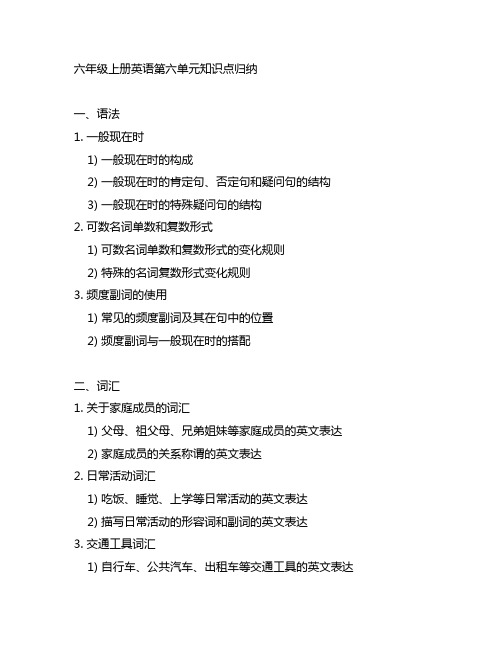
六年级上册英语第六单元知识点归纳一、语法1. 一般现在时1) 一般现在时的构成2) 一般现在时的肯定句、否定句和疑问句的结构3) 一般现在时的特殊疑问句的结构2. 可数名词单数和复数形式1) 可数名词单数和复数形式的变化规则2) 特殊的名词复数形式变化规则3. 频度副词的使用1) 常见的频度副词及其在句中的位置2) 频度副词与一般现在时的搭配二、词汇1. 关于家庭成员的词汇1) 父母、祖父母、兄弟姐妹等家庭成员的英文表达2) 家庭成员的关系称谓的英文表达2. 日常活动词汇1) 吃饭、睡觉、上学等日常活动的英文表达2) 描写日常活动的形容词和副词的英文表达3. 交通工具词汇1) 自行车、公共汽车、出租车等交通工具的英文表达2) 表达乘坐交通工具的动词短语三、对话1. 家庭成员的自我介绍1) 介绍自己的家庭成员及其职业2) 询问他人家庭成员情况并作出回应2. 日常活动的询问和回答1) 询问他人的日常活动安排2) 回答他人关于日常活动安排的提问3. 交通工具的使用1) 问询他人乘坐何种交通工具2) 回答他人关于乘坐交通工具的问题四、阅读理解1. 阅读短文并回答问题1) 掌握阅读短文中常见的语言表达方式2) 能够根据短文内容回答相关问题2. 阅读对话并完成句子1) 能够理解对话中人物之间的交流2) 能够根据对话内容填写相关句子的空白部分五、作文1. 描写家庭成员和日常活动1) 利用所学知识,描述自己的家庭成员及其日常活动2) 运用一般现在时和相关词汇,完成一篇简短的作文结语六年级上册英语第六单元主要涵盖了一般现在时的语法知识、家庭成员、日常活动和交通工具等词汇,通过对话和阅读理解的练习加深了学生对这些知识的理解和运用能力。
希望同学们能够通过学习,巩固所学知识,提高英语口语和写作能力。
六年级上册英语第六单元知识点归纳一、语法1. 一般现在时1) 一般现在时的构成2) 一般现在时的肯定句、否定句和疑问句的结构3) 一般现在时的特殊疑问句的结构4) 句子中的第三人称单数动词变化规则2. 可数名词单数和复数形式1) 可数名词单数和复数形式的变化规则2) 特殊的名词复数形式变化规则3) 不规则名词复数形式变化规则3. 频度副词的使用1) 常见的频度副词及其在句中的位置2) 频度副词与一般现在时的搭配3) 频度副词在句子中的位置及其对句子的影响二、词汇1. 关于家庭成员的词汇1) 父母、祖父母、兄弟姐妹等家庭成员的英文表达2) 家庭成员的关系称谓的英文表达3) 家庭成员的描述性词汇2. 日常活动词汇1) 吃饭、睡觉、上学等日常活动的英文表达2) 描写日常活动的形容词和副词的英文表达3) 表达日常活动频率的词汇3. 交通工具词汇1) 自行车、公共汽车、出租车等交通工具的英文表达2) 表达乘坐交通工具的动词短语3) 描述交通工具特征和用途的词汇三、对话1. 家庭成员的自我介绍1) 介绍自己的家庭成员及其职业2) 询问他人家庭成员情况并作出回应3) 描述家庭成员的特征和喜好2. 日常活动的询问和回答1) 询问他人的日常活动安排2) 回答他人关于日常活动安排的提问3) 表达对日常活动的看法和喜好3. 交通工具的使用1) 问询他人乘坐何种交通工具2) 回答他人关于乘坐交通工具的问题3) 描述自己喜欢的交通工具及其原因四、阅读理解1. 阅读短文并回答问题1) 掌握阅读短文中常见的语言表达方式2) 能够根据短文内容回答相关问题3) 分析短文中的人物关系和情节发展2. 阅读对话并完成句子1) 能够理解对话中人物之间的交流2) 能够根据对话内容填写相关句子的空白部分3) 阅读对话并理解对话背后的含义和情境五、作文1. 描写家庭成员和日常活动1) 利用所学知识,描述自己的家庭成员及其日常活动2) 运用一般现在时和相关词汇,完成一篇简短的作文3) 通过对家庭成员和日常活动的作文,培养学生的描述和表达能力2. 书信或日记的写作1) 写一封书信或日记,描述自己一天的日常活动2) 运用一般现在时态和相关词汇,描述事件的发生和感受3) 通过写信或日记,培养学生书面表达能力和情感表达能力结语六年级上册英语第六单元主要涵盖了一般现在时的语法知识、家庭成员、日常活动和交通工具等词汇,通过对话和阅读理解的练习加深了学生对这些知识的理解和运用能力。
英语六年级上册知识点归纳
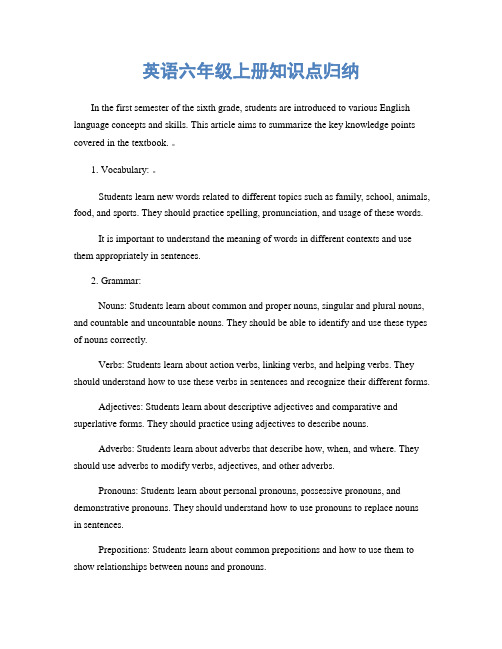
英语六年级上册知识点归纳In the first semester of the sixth grade, students are introduced to various English language concepts and skills. This article aims to summarize the key knowledge points covered in the textbook. 。
1. Vocabulary: 。
Students learn new words related to different topics such as family, school, animals, food, and sports. They should practice spelling, pronunciation, and usage of these words.It is important to understand the meaning of words in different contexts and use them appropriately in sentences.2. Grammar:Nouns: Students learn about common and proper nouns, singular and plural nouns, and countable and uncountable nouns. They should be able to identify and use these types of nouns correctly.Verbs: Students learn about action verbs, linking verbs, and helping verbs. They should understand how to use these verbs in sentences and recognize their different forms.Adjectives: Students learn about descriptive adjectives and comparative and superlative forms. They should practice using adjectives to describe nouns.Adverbs: Students learn about adverbs that describe how, when, and where. They should use adverbs to modify verbs, adjectives, and other adverbs.Pronouns: Students learn about personal pronouns, possessive pronouns, and demonstrative pronouns. They should understand how to use pronouns to replace nounsin sentences.Prepositions: Students learn about common prepositions and how to use them to show relationships between nouns and pronouns.Conjunctions: Students learn about coordinating conjunctions and how to use them to join words, phrases, and sentences.Tenses: Students learn about present, past, and future tenses of verbs. They should practice using verbs in different tenses to express actions at different times.Sentence Structure: Students learn about subject-verb agreement, sentence types (declarative, interrogative, imperative, and exclamatory), and sentence fragments andrun-on sentences. They should be able to construct grammatically correct sentences.3. Reading Comprehension:Students practice reading passages and answering questions based on the text. They should be able to understand the main idea, identify supporting details, make inferences, and draw conclusions from the given information.4. Writing Skills:Students learn how to write different types of sentences (simple, compound, and complex) and paragraphs. They should practice organizing their ideas and using appropriate vocabulary and grammar in their writing.Students also learn about capitalization, punctuation (end marks, commas, apostrophes), and spelling rules. They should apply these rules correctly in their writing.5. Listening and Speaking:Students listen to audio recordings and participate in conversations and discussions. They should practice listening for specific information, following instructions, and expressing their ideas clearly.6. Culture and Society:Students learn about different cultures, traditions, and customs of English-speaking countries. They should develop an understanding and appreciation for cultural diversity.In conclusion, the sixth-grade English curriculum covers a wide range of knowledge points including vocabulary, grammar, reading comprehension, writing skills, listening, speaking, and cultural awareness. By mastering these concepts and skills, students will be well-prepared for further English language learning.。
完整版)外研版小学英语六年级上册语法知识点总结
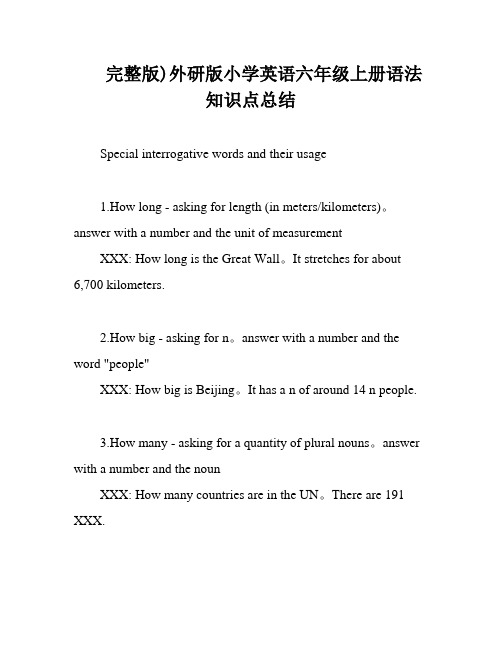
完整版)外研版小学英语六年级上册语法知识点总结Special interrogative words and their usage1.How long - asking for length (in meters/kilometers)。
answer with a number and the unit of measurementXXX: How long is the Great Wall。
It stretches for about 6,700 kilometers.2.How big - asking for n。
answer with a number and the word "people"XXX: How big is Beijing。
It has a n of around 14 n people.3.How many - asking for a quantity of plural nouns。
answer with a number and the nounXXX: How many countries are in the UN。
There are 191 XXX.4.Where - asking for a n or n。
answer with a specific place or nXXX: Where is New York。
It is XXX America.5.When - asking for a specific time。
answer with a time or a time rangeXXX: When is the UN building open。
It opens at 9:45.6.What time - asking for the current time。
answer with the timeXXX: What time is it。
六年级上册英语第七单元知识梳理
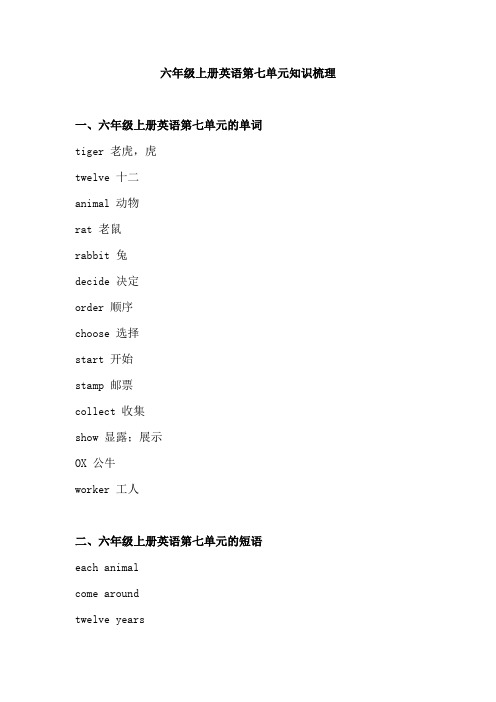
六年级上册英语第七单元知识梳理一、六年级上册英语第七单元的单词tiger 老虎,虎twelve 十二animal 动物rat 老鼠rabbit 兔decide 决定order 顺序choose 选择start 开始stamp 邮票collect 收集show 显露;展示OX 公牛worker 工人二、六年级上册英语第七单元的短语each animalcome aroundtwelve yearsgo to the dentistpractice together三、六年级上册英语第七单元的重点句型1.How often does each animal come around?Every twelve years.2.Which animal was the first of the twelve?It was the rat.3.What is it?It's a tiger-year stamp.4.What is your birth-year animal,Mike?I'm an ox.四、六年级上册英语第七单元的特殊疑问句(一)特殊疑问句的概念特殊疑问句是用来对句子中某一特殊部分进行提问的疑问句,句末多用降调。
(二)特殊疑问句的特殊疑问词特殊疑问句的特殊疑问词有:what、who、whom、whose、which、when、where、why、how等。
(三)特殊疑问句举例1、what表示“什么”,提问表示“物”的主语。
如:What is your birth-year animal,Mike?What is it?2、which表示“哪一个”。
如:Which animal was the first of the twelve?3、how表示“如何”,提问方式或身体状况。
如:How often does each animal come around?4、why表示“为什么”,提问原因。
(完整版)六年级英语上册重点知识点及语法
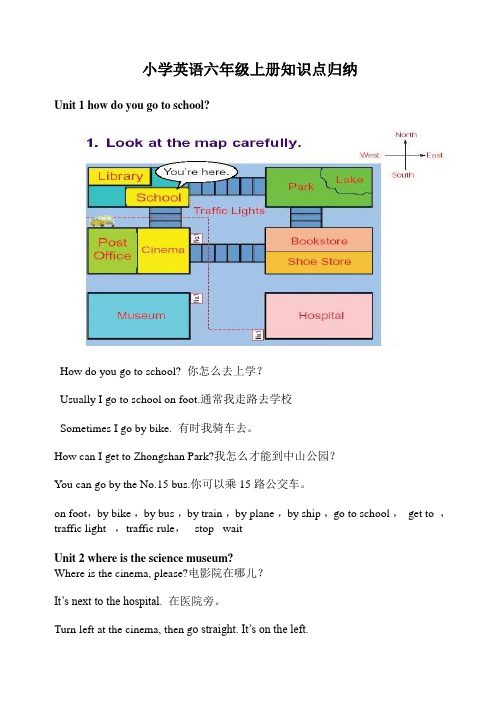
在电影院左转,然后直走,它就在左边
library post,office hospital ,cinema , bookstore , next to , turn right , turn left , go straight , then ,
Unit 3 what are you going to do? What are you going to do on the weekend?周末你准备去哪儿?
(一)名词单复数
1.一般情况,直接加-s,如:book-books, bag-bags, cat-cats, bed-beds 2 . 以 s. x. sh. ch 结 尾 , 加 -es , 如 : bus-buses, box-boxes, brush-brushes,
watch-watches 3 . 以 “ 辅 音 字 母 +y” 结 尾 , 变 y 为 i, 再 加 -es , 如 : family-families,
Betty: Which bus can you take ? Tom: I can take the No.18 bus. Betty:How do you go to my home,Mary? Mary: Oh, My home is quite far from yours. I go there by car. My father is free today. He can
九、阅读理解。(10%)
Today is Betty’s birthday. Some friends will go to Betty’s home. They are Lucy,Tom,Mary and Jack. Betty: Hello,Lucy! How do you go to my home? Lucy: I go to your home by bike because it’s near. Betty: How about you ,Tom? Tom: I go there by bus .
(2020年整理)六年级英语上册重点知识点及语法.doc
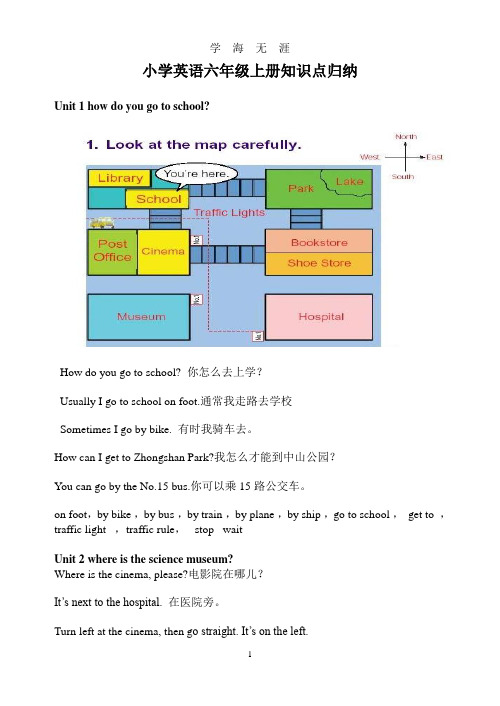
小学英语六年级上册知识点归纳Unit 1 how do you go to school?How do you go to school? 你怎么去上学?Usually I go to school on foot.通常我走路去学校Sometimes I go by bike. 有时我骑车去。
How can I get to Zhongshan Park?我怎么才能到中山公园?You can go by the No.15 bus.你可以乘15路公交车。
on foot,by bike ,by bus ,by train ,by plane ,by ship ,go to school ,get to ,traffic light ,traffic rule,stop waitUnit 2 where is the science museum?Where is the cinema, please?电影院在哪儿?It’s next to the hospital. 在医院旁。
Turn left at the cinema, then g o straight. It’s on the left.在电影院左转,然后直走,它就在左边library post,office hospital ,cinema ,bookstore ,next to , turn right ,turn left ,go straight ,then ,Unit 3 what are you going to do?What are you going to do on the weekend?周末你准备去哪儿?I’m going to visit my grandparents this weekend. 这个周末我要去看望我祖父母。
Where are you going this afternoon?今天下午你去哪儿?I’m going to the bookstore. 我要去书店。
英语六年级上册 7知识点
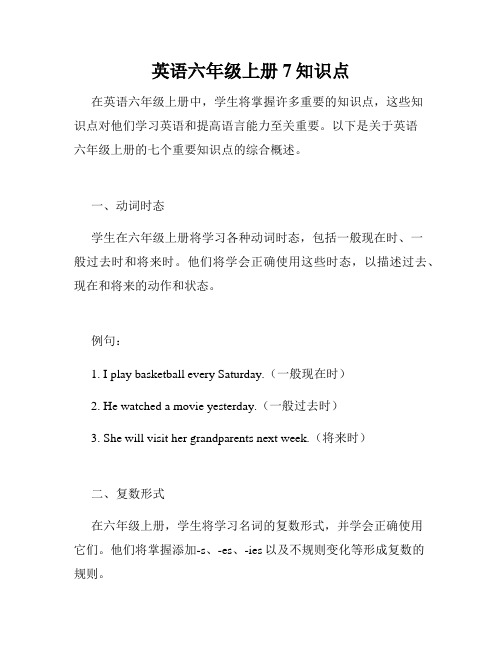
英语六年级上册 7知识点在英语六年级上册中,学生将掌握许多重要的知识点,这些知识点对他们学习英语和提高语言能力至关重要。
以下是关于英语六年级上册的七个重要知识点的综合概述。
一、动词时态学生在六年级上册将学习各种动词时态,包括一般现在时、一般过去时和将来时。
他们将学会正确使用这些时态,以描述过去、现在和将来的动作和状态。
例句:1. I play basketball every Saturday.(一般现在时)2. He watched a movie yesterday.(一般过去时)3. She will visit her grandparents next week.(将来时)二、复数形式在六年级上册,学生将学习名词的复数形式,并学会正确使用它们。
他们将掌握添加-s、-es、-ies以及不规则变化等形成复数的规则。
例句:1. I have three cats.(一般复数形式)2. My brother collects stamps.(以s、o、x、ch、sh结尾的名词加-es形式)3. There are many children in the park.(以辅音字母+y结尾的名词变-y为-i,再加-es形式)三、形容词比较级与最高级六年级上册的学生将学习形容词比较级与最高级的用法,以及相应的规则。
他们将能够描述物体、人物或事物之间的比较程度。
例句:1. She is taller than her sister.(比较级)2. This is the tallest building in the city.(最高级)四、名词所有格学生将学习名词所有格的使用方法,以及如何在句子中表示所有关系。
他们将学会在名词后加-apostrophe(’)和-s(或直接加-apostrophe-s)来构建所有格形式。
例句:1. This is my sister's book.(用-apostrophe-s表示所有)2. The children's toys are on the table.(用-s-apostrophe表示所有)五、介词短语通过学习介词短语的用法,学生将能够描述物体或人物之间的位置关系。
完整外研版小学英语六年级上册语法知识点总结,文档
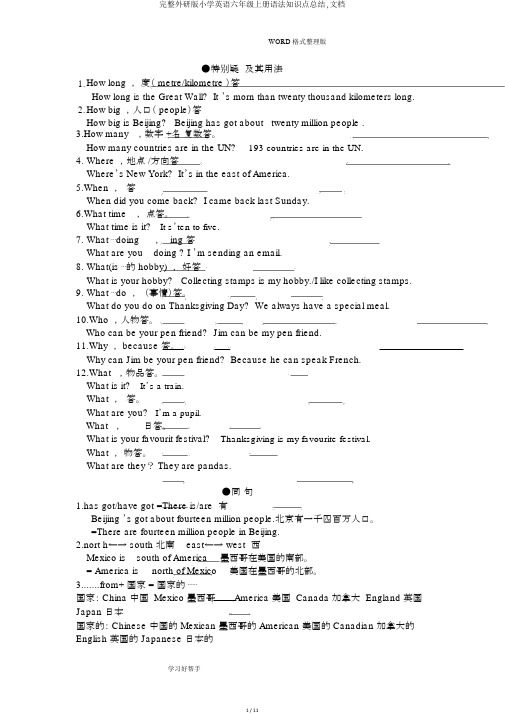
WORD 格式整理版●特别疑及其用法1. How long ,度( metre/kilometre )答How long is the Great Wall? It ’s morn than twenty thousand kilometers long.2. How big ,人口( people)答How big is Beijing? Beijing has got about twenty million people .3.How many,数字+名复数答。
How many countries are in the UN?193 countries are in the UN.4.Where ,地点 /方向答Where’s New York? It’s in the east of America.5.When ,答When did you come back? I came back last Sunday.6.What time,点答。
What time is it?It s’ten to five.7. What ⋯doing,ing答What are you doing ? I ’m sending an email.8.What(is ⋯的 hobby) ,好答What is your hobby? Collecting stamps is my hobby./I like collecting stamps.9.What ⋯do ,(事情)答。
What do you do on Thanksgiving Day? We always have a special meal.10.Who ,人物答。
Who can be your pen friend? Jim can be my pen friend.11.Why , because 答。
Why can Jim be your pen friend? Because he can speak French.12.What ,物品答。
- 1、下载文档前请自行甄别文档内容的完整性,平台不提供额外的编辑、内容补充、找答案等附加服务。
- 2、"仅部分预览"的文档,不可在线预览部分如存在完整性等问题,可反馈申请退款(可完整预览的文档不适用该条件!)。
- 3、如文档侵犯您的权益,请联系客服反馈,我们会尽快为您处理(人工客服工作时间:9:00-18:30)。
小学英语六年级上册知识点归纳Unit 1 how do you go to school?How do you go to school? 你怎么去上学?Usually I go to school on foot.通常我走路去学校Sometimes I go by bike. 有时我骑车去。
How can I get to Zhongshan Park?我怎么才能到中山公园?You can go by the No.15 bus.你可以乘15路公交车。
on foot,by bike ,by bus ,by train ,by plane ,by ship ,go to school ,get to ,traffic light ,traffic rule,stop waitUnit 2 where is the science museum?Where is the cinema, please?电影院在哪儿?It’s next to the hospital. 在医院旁。
Turn left at the cinema, then g o straight. It’s on the left.在电影院左转,然后直走,它就在左边library post,office hospital ,cinema ,bookstore ,next to , turn right ,turn left ,go straight ,then ,Unit 3 what are you going to do?What are you going to do on the weekend?周末你准备去哪儿?I’m going to visit my grandparents this weekend. 这个周末我要去看望我祖父母。
Where are you going this afternoon?今天下午你去哪儿?I’m going to the bookstore. 我要去书店。
What are you going to buy? 你要去买什么?I am going to buy a comic book..我要去买一本漫画书。
next week ,this morning ,this afternoon ,this evening ,comic book ,newspaper,buy post card第二部分:语法知识一.名词:名词单复数,名词的格(一)名词单复数1.一般情况,直接加-s,如:book-books, bag-bags, cat-cats, bed-beds2.以s. x. sh. ch结尾,加-es,如:bus-buses, box-boxes, brush-brushes, watch-watches3.以“辅音字母+y”结尾,变y为i, 再加-es,如:family-families, strawberry-strawberries4.以“f或fe”结尾,变f或fe为v, 再加-es,如:knife-knives5.不规则名词复数:man-men, woman-women, policeman-policemen, policewoman-policewomen, mouse-micechild-children, foot-feet, tooth-teeth, fish-fish, people-people, Chinese-Chinese, Japanese-Japanese不可数名词的复数就是原型:paper, juice, water, milk, rice, tea(二)名词的格(1) 有生命的东西的名词所有格:a)单数后加’s 如: Lucy’s ruler my father’s shirtb)以s 结尾的复数名词后加’如: his friends’ bagsc)不以s 结尾的复数后加’s children’s shoes⚫并列名词中,如果把’s加在最后一个名词后,表示共有, 如: Tom and Mike’s car 汤姆和迈克共有的小汽车⚫要表示所有物不是共有的,应分别在并列名词后加’sTom’s and Mike’s cars 汤姆和麦克各自的小汽车(2)表示无生命东西的名词通常用“ of +名词”来表示所有关系:如:a picture of the classroom a map of China二.冠词:不定冠词,定冠词种类:(1)不定冠词:a / an a unit / an uncle元音开头的可数名词前用an :an egg / an apple / an orange / an eraser / an answer / an ID card / an alarm clock / an actor / an actress / an e-mail / an address / an event / an example / an opera / an houran old man / an interesting book / an exciting sport / an action movie / an art lesson /(2)定冠词:the the egg the plane2. 用法:定冠词的用法:(1)特指某(些)人或某(些)物:The ruler is on the desk.(2)复述上文提到的人或物:He has a sweater. The sweater is new.(3)谈话双方都知道的人或物:The boys aren’t at school.(4)在序数词前:John’s birthday is February the second.(5)用于固定词组中:in the morning / afternoon / evening不用冠词的情况:(1)专有名词前:China is a big country.(2)名词前有定语:this , that , my , your , some, any , no 等:This is my baseball.(3)复数名词表示一类人和事:Monkeys can’t swim. They are teachers.(4)在节日,日期,月份,季节前:Today is Chr istmas Day. It’s Sunday.(5)一日三餐前:We have breakfast at 6:30.(6)球类棋类运动前:They often play football after class. He plays chess at home.* 但乐器前要用定冠词:I play the guitar very well.(7)学科名称前:My favorite subject is music.(8)在称呼或头衔的名词前:This is Mr Li.(9)固定词组中:at noon at night by bus三、代词:人称代词,物主代词人称代词物主代词主格宾格第一人称单数I(我)me my(我的)复数we(我们)us our(我们的)第二人称单数you(你)you your(你的)复数you(你们)you your(你们的)第三人称单数he(他)him his(他的)she(她)her her(她的)it(它)it its(它的)复数they(他们/她们/它们)themtheir(他们的/她们的/它们的)四、形容词,副词:比较级,最高级(一)、形容词的比较级1、形容词比较级在句子中的运用:两个事物或人的比较用比较级,比较级后面一般带有单词than。
比较级前面可以用more, a little来修饰表示程度。
than后的人称代词用主格(口语中可用宾格)。
2.形容词加er的规则:⑴一般在词尾加er ;⑵以字母e 结尾,加r ;⑶以一个元音字母和一个辅音字母结尾,应双写末尾的辅音字母,再加er ;⑷以“辅音字母+y”结尾,先把y变i,再加er 。
3.不规则形容词比较级:good-better, beautiful-more beautiful(二)副词的比较级1.形容词与副词的区别(有be用形,有形用be;有动用副,有副用动)⑴在句子中形容词一般处于名词之前或be动词之后⑵副词在句子中最常见的是处于实义动词之后2.副词比较级的变化规则基本与形容词比较级相同(不规则变化:well-better, far-farther)六年级英语上册第一单元测试题二、排列句子,注意标点符号。
(15%) 1.2. 3. 4.5.九、阅读理解。
(10%)Today is Betty ’s birthday. Some friends will go to Betty ’s home. They are Lucy,Tom,Mary and Jack.Betty: Hello,Lucy! How do you go to my home? Lucy: I go to your home by bike because it ’s near. Betty: How about you ,Tom? Tom: I go there by bus .Betty: Which bus can you take ? Tom: I can take the No.18 bus.Betty:How do you go to my home,Mary?Mary: Oh, My home is quite far from yours. I go there by car. My father is free today. He cantake me there.Betty: Do you come to my home by bike or on foot, Jack? Jack:Oh, I go there on foot.( )1. Whose birthday is it?A. It ’s Betty ’s.B. It ’s Mary ’s.C. It ’s Lucy ’s. ( )2.How does Tom go to Betty ’s home?A.By car.B. By bus.C. By bike. ( )3.Is Mary ’s home far from Betty ’s ?you to how do school go Hangzhou to I by go bus by go No.5 bus can you the get canBinjiang park to how I traffic the remember rulesA. Yes, it is.B. Yes, it isn’t.C.No, it isn’t..( )4.How does Jack go to Betty’s home?A. On foot.B.By bike.C.by car .( )5.How many friends go to Betty’s home on foot ?A. Two.B. One.C.Three.八、1.How do you go to school ?2.I go to Hangzhou by bus .3.You can go by the No.5 bus .4.How can I get to Binjiang Park ?5.Remember the traffic rules.九、1.A 2.B 3.A 4.A 5.B单词:Unit 1☆by(经……;乘……) ☆foot(脚)☆bike(自行车)☆bus(公共汽车)☆train(火车)☆plane(飞机) ship(船)subway(地铁)☆how(怎样)☆go to school(上学)△then(然后)fifth(第五)☆traffic(交通)traffic light(交通灯)☆traffic rule(交通规则)☆stop(停)☆wait(等)remember(记住)☆get to(到达)find(寻找;找到)difference(不同;区别)same(相同的)every(每个;所有的)country(国家)△always(总是;一直)mean(意思是)drive(驾驶)right(右边)side(边)England(英国)Australia(澳大利亚)however(但是)left(左边的) if(如果) must(必须) khow(知道)Unit2☆library(图书馆) ☆post office(邮局) ☆hospital(医院) ☆cinema(电影院)☆bookstore(书店) science museum(科学博物馆) △excuse me(对不起)☆where(在哪里;到哪里) ☆please(请) ☆next to (与……相邻) far(远) supermarket(超市) bank(银行) after school(放学以后) △want (想要)buy(购买)△a pair of (一双)get off(下车) △minute(分钟) north(北)south(南) east(东) west(西)☆turn(转弯)☆right(右边)☆left(左边)☆straight(成直线地)☆than(然后)twelfth(第十二) party(聚会;派对)△ tell(告诉)start(开始)△take(乘坐)look for(寻找)unit3☆next week (下周) ☆this morning (今天上午) ☆this afternoon(今天下午)☆this evening(今天晚上)tonight(今晚)tomorrow(明天)take a trip(去旅行)read a magazine(阅读杂志)go to the cinema(去看电影)theme park(主题公园)the Great Wall(长城)busy(忙碌的)together(一起地)☆comic book(漫画书)☆post card(明信片)☆newspaper(报纸)magazine(杂志)dictionary(词典;字典)△shoe store (鞋店) ☆buy(购买)fruit stand(水果摊)pet shop(宠物商店) need(需要) plant(植物) else(其他;另外)shop(商店)。
